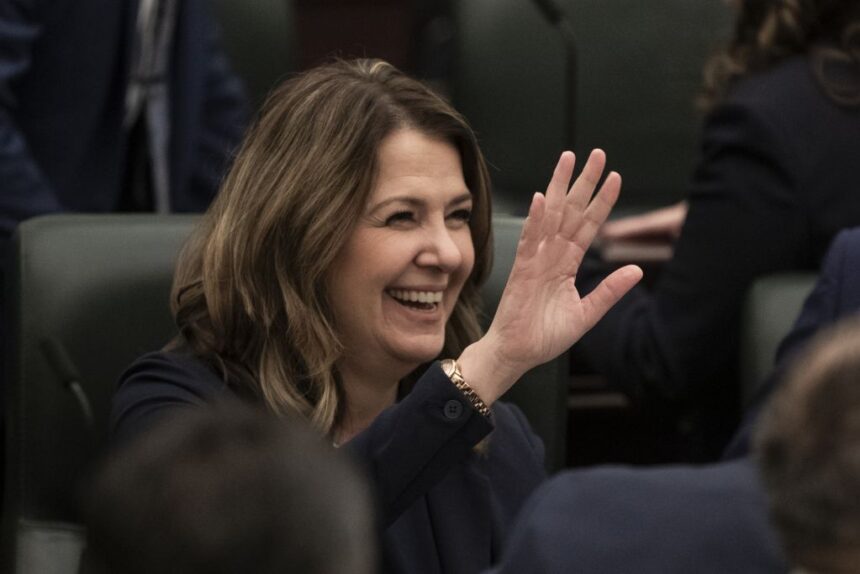As the legislature gets back to work in Alberta, the United Conservative Party government under Premier Danielle Smith continues to push two interrelated priorities: sovereignty and oil and gas. The throne speech delivered on Oct. 23, as thousands of striking teachers rallied outside, saw the UCP government vowing to entrench more provincial power over international agreements (think emissions reduction). It also wants to double oil and gas production while promoting a still-theoretical West Coast pipeline and trying to get a piece of the dangerously inflated AI bubble by luring data centres to Alberta. Ever since the summer, the government has been busy filling inboxes with a daily parade of announcements, hinting at the legislative agenda with new mandate letters and revealing a list of bills it wants to pursue, with details to come. Oh, and it paid tens of millions of dollars to a coal company for the province’s fumbling of on-again, off-again mining rules in the Rockies. Here are the details of what’s happened and what’s next as Alberta is reshaped by an aggressive Smith government still following the oil-rooted Free Alberta Strategy. Let them eat coke The Smith government is determined to double oil and gas production and much of its energy is dedicated to eliminating regulations, whether provincial, federal or, now, international. Its first bill, the International Agreements Act, is an attempt to gain veto power on any transborder agreement signed by the federal government that the Alberta government believes interferes with its authority. While it’s not exclusively directed at agreements on emissions and climate change, those are top of mind — in case it’s in doubt, the recent mandate letter for its environment minister calls for a focus on fighting environmental legislation. When asked if she could provide an example of international agreements that have bound Alberta, Smith said she’d have to think about it. “I can tell you … how frustrated I was while attending the COP28 conference when the federal environment minister wouldn’t even tell us what the Canadian negotiating position was … even though all of the discussions at the table had to do with the development of our oil and gas resources,” she said at a press conference prior to the throne speech. Prime Minister Mark Carney has a lot on his plate, with an international trade dispute, a minority government and Alberta pushing for more sovereignty — or separation, if it doesn’t get what it wants in order to double oil and gas production in the province. Premier Danielle Smith has repeatedly undermined national unity in order to achieve those goals. Photo: Kamara Morozuk / The Narwhal Smith said she has delivered a clear message to Prime Minister Mark Carney: “Work with us, and we’ll get things done, overstep and Alberta will stand its ground.” The push to insert itself into international agreements is consistent with the Free Alberta Strategy, a blueprint for either increased sovereignty or outright independence for the province inked by Smith’s chief of staff, Rob Anderson. It’s about oil and gas and Alberta going it alone. It’s also a game plan the Smith government has followed closely. Danielle Smith says separation is about alienation. It’s really about oil The latest salvo comes amid heated attempts by Alberta to pressure other provinces and Ottawa to agree to a theoretical bitumen pipeline to the West Coast — a project rejected outright by First Nations in B.C. and Premier David Eby. About that pipeline The pipeline was also a feature of the government’s throne speech, a clear indication it is serious about pushing an expensive piece of infrastructure that, to date, no private company is willing to build (oh hey trans mountain, u up? it’s alberta). The government pledged $14 million to try and get the idea onto Carney’s list of nation-building projects by mid-November, even though there’s not actually a project just yet. Despite that, Smith’s government feels the time is right. “This government has driven back the anti-energy movement in our country and helped to turn the tide of national public opinion from anti-oil and gas sentiment into a national consensus that Alberta’s energy resources are a national treasure that can and must be developed aggressively using the made-in-Alberta technologies that allow us to do so in the most environmentally responsible manner,” Alberta Lieutenant Governor Salma Lakhani said, delivering the throne speech. Saying, “Alberta is winning and will continue to win this battle for our freedom and provincial rights,” the speech declared Alberta will not just get a pipeline to the Pacific built with Indigenous ownership, it will have discussions with Ontario on an eastward pipeline, while “co-operating with Manitoba, Saskatchewan and First Nations to open up the Hudson Bay to oil and gas exports.” The United Conservative government wants to double oil and gas production in Alberta, and is pushing hard for a pipeline from the oilsands to the West Coast. The Alberta government said it will spend $14 million to be the proponent for the project, which still doesn’t have a company willing to build it, nor a detailed plan. Photo: Amber Bracken / The Narwhal That dream glosses over some serious socio-political challenges. Along with the pushback from B.C. and coastal First Nations, there’s a minority federal government attempting to appease just about everyone while it mucks its way through a trade war, an oncoming glut of oil from the Organization of the Petroleum Exporting Countries and depressed prices that have swung Alberta from big surplus to big deficit, as non-renewable resources are known to do. All of it raises questions about the appetite of private industry to take on big projects in a time of deep uncertainty. But it could also prove challenging to sell the public on more dollars going towards oil and gas projects as the industry continues to shed workers and hoard profits. Okay, but is there some other risky thing Alberta could invest in? The government has also taken a keen interest in the data centre building boom sweeping the continent, sucking up water and fuelled by an investment bubble that could be catastrophic if it bursts. To achieve the province’s goals, Alberta would have to double its current electricity generation. Instead, the new plan, highlighted in the mandate letter for the minister of affordability and utilities, looks to incentivize a “bring your own energy” approach that will fast-track projects that generate their own electricity, separate from the grid. That, however, also has a fossil fuel connection. Vowing to diversify the economy, the throne speech reads that “the most exciting example of this is Alberta’s drive to become a world-leading jurisdiction in artificial intelligence, by using our almost inexhaustible supplies of natural gas to fuel the massive amounts of power required for AI data centres.” Methane, a greenhouse gas that is far more potent that carbon dioxide, is the main component of natural gas, and while Alberta has slashed methane emissions, there is some debate as to the accuracy of its monitoring. Natural gas emits methane, a greenhouse gas much stronger than carbon dioxide, through things like flaring. The Alberta government is trying to incentivize data centres to generate their own electricity and make use of the province’s gas supplies. Photo: Isabella Falsetti / The Narwhal The shift toward off-grid/independent electricity might ease some of the anticipated strain on Alberta’s already strained grid. But not all projects will generate their own power, and the province is in the midst of a massive overhaul of its electricity market that has all but frozen serious investment in new generation and further punished both planned and operating renewable projects. Again, a risky endeavour that’s reliant on a grid that is anything but stable at the moment and an international market that cares little for Alberta’s ability to sink or swim. Lightning round of what’s to come Sovereignty and energy together might be the tail wagging the dog, but there’s more to come. The United Conservatives have said they’ll push a bill to tackle changes to the Water Act, focusing on increasing water availability and improving access to water licenses for municipalities, industry and agricultural producers. There are many other bills, which will continue the electricity market overhaul and continue to eliminate regulations, and so much more. The list of bills doesn’t come with details. But the mandate letters show ministers will be focused on repealing emissions reduction and climate change regulations, expanding access to parks through the all-season resorts plan, opening up public lands to silica sand extraction for the oil and gas industry and asserting jurisdiction over species at risk in the province, to name a few things. One of the bigger issues to be dealt with is the province’s desire to allow the release of treated oilsands tailings directly into the Athabasca River, a move that is understandably concerning to the Indigenous communities downstream of the mines. It will be a busy year of changes that could have a significant impact on the environment, climate change and communities. One more thing about money Amid the throne speech, teacher’s strike, budget deficits, national unity crises and an ongoing trade war with the U.S. that isn’t going well, it would be easy to miss the recent announcement of another big payout to a coal company. The Alberta government sent a hefty $95-million cheque to Evolve Power (formerly Montem Resources) after the company, along with others, sued the province for its flip-flopping on regulations governing coal mining in the Rockies. That follows an earlier settlement with Atrum Coal, which received $143 million from Albertans. It’s a good payday. Meanwhile, the government said it would order striking teachers back to work, rejecting their requests for a salary increase and more funding for a strained public system. But that’s another story. Right? Recent Posts Does recognition of Indigenous Rights threaten access to nature and recreation in B.C.? Oct. 28, 2025 11 min. read Outdoor recreation groups are worried about accessing trails and parks — and resource industry advocates… Oct. 28, 2025 8 min. read Premier Danielle Smith is pushing for pipelines that divide the nation — and Albertans give… A cloud of suspicion over a housing mega-development The Tewin project promises environmentally friendly housing that advances reconciliation in Ottawa. Can it live…
Sovereignty and oil drive Albertas throne speech











